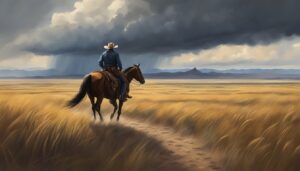The critically acclaimed series “1883” captivated audiences with its raw depiction of the American frontier. While the show’s gritty realism and stunning landscapes drew viewers in, its exploration of faith and fate added depth to the characters’ journeys.
Religion played a significant role in shaping the worldviews and decisions of the Dutton family and other travelers on their perilous trek westward. Faith provided solace and guidance in the face of harsh realities, while also raising questions about divine purpose and human free will. The characters grappled with their beliefs as they encountered life-altering challenges and tragedies along the Oregon Trail.
Through the lens of faith, “1883” examined how individuals reconcile their spiritual convictions with the brutal realities of frontier life. The show portrayed both the strength that religious beliefs can provide in times of hardship and the doubts that arise when faced with seemingly senseless suffering. This nuanced approach to religion added layers of complexity to the characters and their motivations throughout the series.
Historical Context of ‘1883’

The late 19th century was a period of rapid change and expansion in American history. Westward migration, industrialization, and evolving social norms shaped the era depicted in ‘1883’.
Socio-Political Landscape
The 1880s marked the end of Reconstruction and the rise of the Gilded Age. Economic growth and technological advancements fueled westward expansion. The Homestead Act of 1862 encouraged settlers to claim land in the frontier. This led to conflicts with indigenous peoples, as the U.S. government broke treaties and forcibly relocated Native American tribes.
The transcontinental railroad, completed in 1869, revolutionized travel and commerce. It played a crucial role in the settlement of the West, making long-distance journeys faster and safer.
Political corruption and social inequality were rampant during this time. The gap between the wealthy industrialists and the working class widened, leading to labor unrest and calls for reform.
Religious Influence on 19th Century Society
Religion played a significant role in shaping 19th-century American society. Christianity, particularly Protestantism, was the dominant faith. Churches served as community centers and sources of moral guidance.
The Second Great Awakening, a religious revival movement, had a lasting impact on American culture. It emphasized personal salvation and social reform, leading to the creation of various religious denominations and reform movements.
Missionaries often accompanied westward expansion, seeking to convert Native Americans and establish new congregations. This sometimes led to cultural clashes and the suppression of indigenous spiritual practices.
The concept of Manifest Destiny, the belief that American expansion was divinely ordained, influenced both political decisions and individual motivations for westward migration.
Main Themes in ‘1883’

The prequel series ‘1883’ explores profound themes that shape the characters’ journey across the American frontier. Faith, freedom, and the tension between belief and reason drive the narrative and character development throughout the show.
Faith Versus Fate
In ‘1883’, characters grapple with the interplay between faith and fate. The harsh realities of frontier life test their beliefs and resolve. James and Margaret Dutton rely on their faith to navigate challenges and protect their family. Elsa Dutton’s journey exemplifies the struggle between youthful optimism and the brutal realities of the West.
The wagon train faces numerous hardships, forcing travelers to question divine providence. Some cling to religious convictions for comfort, while others lose faith in the face of tragedy. This theme explores how individuals reconcile their spiritual beliefs with the seemingly random cruelty of nature and human violence.
The Quest for Freedom and Liberation
Freedom serves as a powerful motivator for the characters in ‘1883’. Immigrants seek economic opportunities and personal autonomy in America. The Duttons pursue the promise of land ownership and self-determination in Montana.
This quest for liberation comes at a high cost. Characters face danger, loss, and moral compromises in their pursuit of a better life. The series examines the price of freedom and questions whether true liberation is achievable on the frontier.
- Physical freedom: Escaping poverty and oppression
- Economic freedom: Seeking land and prosperity
- Personal freedom: Breaking from societal constraints
Exploration of Belief and Reason
‘1883’ delves into the tension between traditional beliefs and rational thinking. Characters must decide when to trust in faith and when to rely on practical reasoning for survival.
The series portrays the clash between:
- Indigenous spiritual beliefs
- Christian faith of settlers
- Scientific and technological advancements
This conflict is embodied in characters like Shea Brennan, who balances military pragmatism with personal faith. The show raises questions about the role of spirituality and reason in forging a new society on the frontier.
Religious Representation and Its Significance

“1883” portrays diverse spiritual beliefs and practices, reflecting the era’s religious landscape. Scripture and doctrines shape characters’ worldviews and actions. The show explores how faith unites and divides individuals from different backgrounds.
Depiction of Spiritual Practices
“1883” showcases various religious rituals and customs. Characters pray before meals and in times of crisis, demonstrating the importance of faith in daily life. Baptisms and funerals highlight pivotal moments, emphasizing religion’s role in marking life transitions.
The series depicts Native American spiritual practices, contrasting them with Western religious traditions. This portrayal underscores the cultural differences and potential conflicts arising from divergent belief systems.
Religious symbols feature prominently, such as crosses worn as jewelry or displayed in homes. These visual cues reinforce the omnipresence of faith in the characters’ lives and the society they inhabit.
Scriptural References and Their Impact
Biblical allusions permeate the dialogue and narration in “1883.” Characters quote verses to find solace, guidance, or justification for their actions. These references resonate with viewers familiar with scripture and provide insight into the characters’ moral compasses.
The show explores how different interpretations of religious texts can lead to conflicting viewpoints. This nuanced approach highlights the complexity of applying ancient wisdom to frontier life.
Scriptural teachings influence decision-making, particularly in ethical dilemmas. Characters wrestle with concepts of sin, redemption, and divine providence, adding depth to their personal journeys and the overall narrative.
Interfaith Dynamics and Common Ground
“1883” portrays interactions between individuals of different faiths, revealing both tensions and unexpected alliances. The series explores how shared hardships on the frontier can bridge religious divides, fostering cooperation and mutual understanding.
Interfaith marriages and friendships challenge characters’ preconceptions, prompting reflection on the nature of spirituality and tolerance. These relationships serve as microcosms for broader societal issues of religious coexistence.
The show depicts instances where characters find common ground in universal spiritual concepts, such as hope, compassion, and the search for meaning. This shared spiritual language transcends specific doctrines, highlighting the human aspects of faith.
Conflicts arising from religious differences are portrayed realistically, showing both the potential for violence and the possibility of peaceful resolution through dialogue and empathy.
Character Analysis and Development

Faith and fate deeply influence the characters’ journeys in “1883.” The show explores how belief shapes decisions and how destiny intertwines with personal agency.
Manifestations of Faith in Major Characters
James Dutton embodies stoic faith, relying on inner strength to guide his family. His wife Margaret balances practicality with spiritual conviction, often turning to prayer in times of crisis. Their daughter Elsa’s faith evolves from youthful idealism to a profound connection with nature and the land.
Shea Brennan grapples with loss of faith after personal tragedy. His journey reflects the struggle to find meaning in suffering. Thomas, an ex-slave, demonstrates unwavering faith in humanity’s potential for good despite past trauma.
Fate and Agency in Character Evolution
Characters in “1883” constantly navigate the tension between predetermined fate and personal choice. Elsa’s narrative arc exemplifies this struggle. Her decisions shape her destiny, yet circumstances beyond her control ultimately seal her fate.
James and Margaret’s choices as parents and pioneers reflect their attempt to carve out a future while accepting the harsh realities of frontier life. Their faith in each other and their mission sustains them through hardships.
Women in the series, like Elsa and Margaret, assert agency within the constraints of their era. Their faith often empowers them to challenge societal norms and forge their own paths.
Influence of Religion on Gender and Ethnicity

Religion played a significant role in shaping gender dynamics and ethnic identities in 1883. It influenced societal norms, power structures, and spiritual practices across different communities.
Women’s Roles within Religious Context
Religious institutions often defined women’s roles in 1883 society. Many faiths emphasized traditional gender roles, with women expected to focus on domestic duties and childrearing. However, some religious organizations provided opportunities for women’s leadership and social engagement.
The National Council of Jewish Women, founded in 1883, exemplified this dynamic. It offered Jewish women a platform for community involvement and philanthropy, while still operating within accepted religious frameworks.
Christian denominations varied in their approach to women’s roles. Some maintained strict gender hierarchies, while others began to allow limited participation in church governance and missionary work.
Indigenous Peoples and Spiritual Identity
Indigenous spiritual practices faced significant challenges from colonialism and Christian missionary efforts in 1883. The U.S. government implemented “Civilization Regulations” that criminalized many Native American religious ceremonies.
These policies aimed to forcibly assimilate Indigenous peoples into Western Christian culture. Traditional spiritual leaders faced persecution, and children were often removed from their communities to attend Christian boarding schools.
Despite these pressures, many Indigenous groups maintained their spiritual identities through secret practices and cultural resistance. Some incorporated elements of Christianity into their existing belief systems, creating syncretic faiths.
The struggle to preserve Indigenous spirituality became intertwined with broader efforts to maintain cultural autonomy and resist colonial power structures.
Educational and Philosophical Insights

“1883” explores profound themes at the intersection of education, philosophy, and faith. The characters grapple with rational thought and religious belief as they face the challenges of frontier life.
The Interplay between Education, Philosophy, and Theology
Education plays a vital role in shaping the worldviews of the characters in “1883.” The more educated individuals tend to approach challenges with a philosophical mindset, questioning traditional beliefs and seeking rational explanations. This creates tension with those who rely more heavily on faith and religious teachings.
The show portrays how formal education influences decision-making and problem-solving on the frontier. Characters with academic backgrounds often apply scientific knowledge to overcome obstacles. In contrast, those with limited formal schooling frequently turn to religious teachings or practical wisdom passed down through generations.
Theological debates arise as characters encounter new cultures and ideas during their journey. These discussions highlight the complex relationship between education, philosophical inquiry, and religious conviction in the late 19th century American West.
Rationalism, Reason, and Faith in Dialogue
“1883” presents a nuanced portrayal of the dialogue between rationalism and faith. Characters often find themselves torn between logical reasoning and spiritual beliefs when confronting life’s challenges and uncertainties.
The harsh realities of frontier life test the limits of both rational thought and religious faith. Some characters rely on scientific knowledge and reasoned analysis to navigate difficulties. Others turn to prayer and divine guidance for strength and direction.
The show explores how individuals reconcile these seemingly opposing worldviews. It depicts moments where reason and faith complement each other, as well as instances where they come into conflict. This tension reflects the broader philosophical debates of the era regarding the role of rationalism in a world still deeply influenced by religious traditions.
Religion’s Place in a Scientific Era

The 19th century saw significant developments in both scientific understanding and religious thought. This period prompted new considerations of how faith and scientific inquiry could coexist and inform one another.
Compatibility of Faith and Science
Many 19th century thinkers sought ways to reconcile religious beliefs with emerging scientific discoveries. Some viewed science as a means of better understanding God’s creation. Others saw scientific inquiry as complementary to faith, each addressing different aspects of human experience.
Prominent figures like geologist Charles Lyell attempted to harmonize biblical accounts with geological evidence. This approach, known as concordism, aimed to show compatibility between scripture and scientific findings.
Some religious leaders embraced scientific advances, seeing them as tools to better appreciate divine works. They argued that scientific knowledge could deepen one’s faith rather than undermine it.
Revelation and Nature in Scientific Discourse
The concept of “two books” – scripture and nature – gained traction among some 19th century scholars. This idea proposed that God revealed truth through both religious texts and the natural world.
Scientists like James Clerk Maxwell incorporated religious perspectives into their work. Maxwell saw his electromagnetic theories as uncovering the mathematical principles underlying God’s creation.
Naturalists often described their scientific observations in quasi-religious terms. They portrayed nature as a testament to divine design and order.
This period also saw the emergence of natural theology. Proponents argued that evidence of God’s existence could be found through rational examination of the natural world.
Legacy and Enduring Impact

“1883” left an indelible mark on television and popular culture. Its portrayal of faith and religion in the American frontier continues to resonate with modern audiences.
Cultural Influence of ‘1883’ on Contemporary Understanding
“1883” reshaped perceptions of the American West. The series depicted faith as a crucial element of pioneer life, highlighting its role in providing comfort and guidance during harsh times. This portrayal challenged romanticized notions of the frontier, offering a more nuanced view of settlers’ experiences.
The show’s authentic representation of religious practices and beliefs in the 19th century sparked renewed interest in historical spirituality. It prompted discussions about the evolution of faith in America and its impact on societal development.
“1883” also influenced other media, inspiring creators to explore themes of faith and resilience in historical contexts. Its success paved the way for more nuanced depictions of religion in period dramas.
Ongoing Relevance of Faith in Modern Times
The themes of faith explored in “1883” remain relevant today. The series’ portrayal of characters relying on their beliefs during difficult journeys resonates with contemporary viewers facing their own challenges.
“1883” highlighted the universal nature of seeking meaning and purpose through faith. This representation encourages reflection on the role of spirituality in modern life, regardless of religious affiliation.
The show’s depiction of diverse faith experiences fostered greater understanding and empathy among viewers. It demonstrated how belief systems can unite communities and provide strength in times of adversity.
“1883” also sparked conversations about the intersection of faith and personal identity in today’s multicultural society. Its legacy continues to influence discussions on the evolving nature of spirituality in the 21st century.



